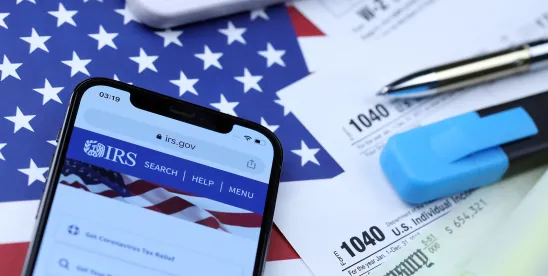On October 4, 2024, the Internal Revenue Service (the “IRS”) released Private Letter Ruling 202440007, which concluded that the lack of income and assets in the first taxable year of an entity that had elected to be treated as a real estate investment trust (“REIT”) did not cause the entity to fail to qualify as a REIT for the year. This ruling provides guidance on an issue of longstanding uncertainty. Although private letter rulings may only be relied upon by the taxpayers who have requested them, the rationale and conclusions that they express generally reflect the IRS’s analysis and current positions. For the reasons discussed below, PLR 202440007 should offer reassurance for the REIT industry and legal practitioners alike.
To qualify as a REIT for U.S. federal income tax purposes, a corporation, trust, or association must satisfy various statutory requirements, including an asset test[1] and two income tests.[2]
In general, a REIT that fails to meet either of the income tests or the asset test will be disqualified as a REIT, and will be ineligible to elect REIT status for five years. While relief may be available to cure a default and forestall the consequences of noncompliance,[3] given the magnitude of those consequences and the uncertainty of whether such relief will be available, the stakes for maintaining REIT qualification are significant.
A lingering question raised by these rules, and with which REITs (and their legal advisors) have long had to grapple, involves the application of these tests to newly-formed entities that have not yet earned income and/or have not yet acquired assets. The IRS had never provided specific guidance to address this fact pattern, creating some concern among the practitioner community that such newly-formed entities could be viewed as failing the income and asset tests, and thus not qualifying as REITs and suffering the consequences referred to above (including the five-year restriction from REIT status). For this reason, many practitioners recommended that a newly-formed REIT unable to acquire its intended assets by an applicable testing date acquire publicly-traded REIT stock in order to ensure that it satisfied the REIT asset and income tests.
PLR 202440007 is the first instance of the IRS directly addressing the issue of whether a REIT qualifies as such during an initial start-up period where it holds no assets or has no income. The ruling concerns a corporation that desired to elect to be treated as a REIT from its first taxable year. However, due to unexpected complications, the corporation did not acquire any assets or generate any gross income until its second taxable year. Consequentially, the company filed a Form 1120-REIT as its U.S. federal income tax return for its first taxable year on the advice of its tax return preparer. The Company subsequently sought a ruling from the IRS to be treated as if it had not made an election to be a REIT for its first taxable year due to not owning any assets or earning and income during the taxable year.
The IRS concluded that the REIT’s lack of assets and absence of gross income did not preclude satisfaction of the asset test or either income test and denied the taxpayer’s request to be treated as if it had not made an election to be a REIT for its first taxable year. The IRS explained that because “95% of $0 equals $0” and “75% of $0 equals $0,” the entity seeking the ruling did, in fact, meet each of the tests. The IRS also examined the legislative history of Section 856 to support its conclusion, noting that the primary concern of the income and asset tests is to ensure that the REIT structure is used for passive income and real estate assets, respectively (and not whether or not the REIT has gross income or assets, in the first instance). The income and asset tests are intended as anti-abuse mechanics, primarily to prevent the tax-favored REIT structure from being utilized for reasons beyond its statutory intent (namely, active conduct of a trade or business and investments in sectors other than real estate), and an entity with no assets or gross income does not implicate those concerns.
Accordingly, the release of PLR202440007 should be comforting to the REIT industry and significantly mitigate the concerns that newly formed REITs that have not yet acquired any assets or generated any gross income will fail the asset or income tests.
[1] The asset test under Section 856(c)(4) of the Code requires that at the close of each quarter for each taxable year, at least 75% of the value of a REIT’s assets must be attributable to real estate assets, cash and cash items, and government securities.
[2] The income test under Section 856(c)(2) of the Code requires that at least 95% of a REIT’s gross income in any taxable year be derived from certain sources, including dividends, interest, rents from real property, gain from the disposition of securities and real property (other than property held primarily for sale to customers in the ordinary course of a trade or business), and other “passive”-type activities. The income test under Section 856(c)(3) of the Code only permits income from a narrower pool of activities with a more overt real estate connection to satisfy the 75% test.
[3] Per Sections 856(c)(6) and 857(b)(5) of the Code, relief may be available for failure to meet the income tests if such failure is due to reasonable cause and not willful neglect, if a schedule is provided that describes each item of gross income covered by the 95% and 75% tests, and if the REIT pays a penalty. Similarly, Section 856(c)(7) of the Code provides that a REIT may not lose its REIT qualification for failing the asset test if the failure is due to reasonable cause and not willful neglect, a schedule is filed describing the asset that caused the failure of the test for the quarter in which the failure occurred, the asset that caused the failure is disposed of within six months after the end of the quarter in which the failure occurred (or the REIT is otherwise able to meet the requirements of the asset test within such six month period), and the REIT pays a penalty (unless the amount is de minimis, i.e., does not exceed the lesser of 1% of the REIT’s total assets at the end of the quarter in question or $10 million).
Additional Author: Thomas Multari








 />i
/>i

